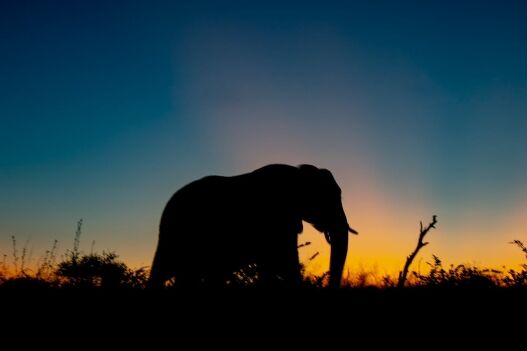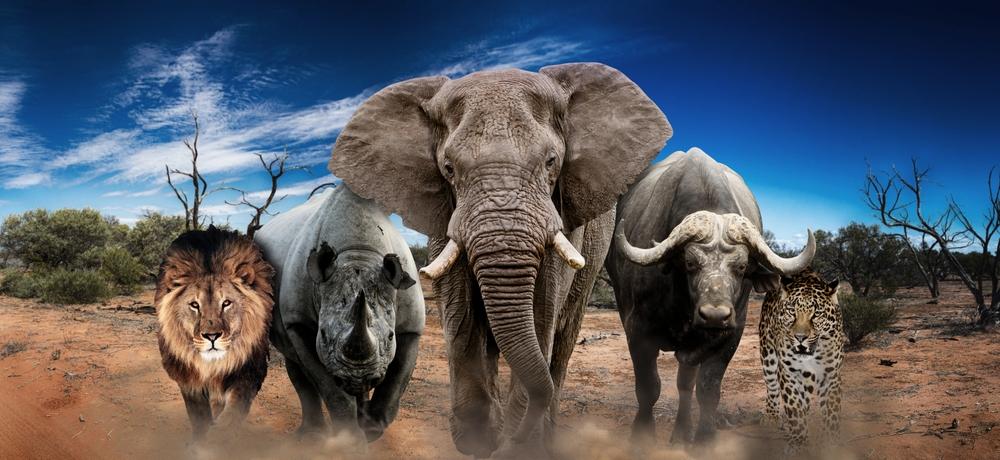
Essential FAQs for Elephant Hunting in Zimbabwe, including permits, gear, and ethical practices. Plan your unforgettable hunting safari.
Zimbabwe is a magnificent country well worth a visit and has prolific wildlife living in its natural habitat. Hunting an elephant is on top of the wish list of most trophy hunters. Achieving a successful elephant kill in the wild requires skill and patience, and there can be nothing to compare with the thrill and danger of the hunt.
Elephant hunting in Zimbabwe is best from February to November, with the prime period being from September to November.
Obtain a hunting permit/license from the Zimbabwe Parks and Wildlife Management Authority. A CITES permit is also required. The funds raised from the sale of these licenses go straight back into the maintenance of the parks.
You can obtain your Zimbabwe visa at the airport or border port of entry to Zimbabwe.
Check with your airline regarding taking your rifle to Zimbabwe. Not all airlines will allow this.
Ensure your passport is valid for at least six months after initial travel, and that you have a return ticket or proof of exit out of the country.
The Zimbabwe currency is in a constant state of flux, so it would be advisable to find out the latest situation before you embark on your trip. Your selected outfitter will advise on how you make payment for your excursion.
Organise international insurance and sufficient medical aid coverage.
Allow plenty of time to prepare in case of unforeseen delays in document processing.
Elephants fall into the Class A Game – that is, thick skinned animals. The minimum legal requirement rifle is a .375 with a 300-grain bullet.
Durable clothing for the African bush, binoculars, camera, comfortable walking boots, a hat, insect repellent, and sunblock should also be on your packing list. Your hunting guide will almost certainly provide you with a comprehensive checklist.
The Zimbabwe Department of National Parks and Wildlife Management (ZDNPWM) and the Zimbabwe Professional Guides Association (ZPGA) work hand in hand to ensure the highest standards of their members. The Zimbabwe Hunting Guides are considered the highest qualified in Africa and are some of the top guides in the world.
Ask your selected guide or either the ZDNPWM or ZPGA for the latest overview of Zimbabwe’s hunting laws and regulations. They can also advise what other permits are required. These organizations are best placed to recommend a suitable outfitter for your hunt.
Depending on your chosen outfitter, your hunting package should include airport transfer, trophy fee, field preparation and transfer of the trophy, food, lodging, guide, tracker, and laundry. Just remember to bring your rifle and ammunition.
A typical day would be an early rise with coffee and rusks, and then the tracking will commence. Most outfitters will have a dedicated tracker who is highly skilled at finding the perfect trophy animal.
Hunting hours are from half an hour before sunrise to half an hour after sunset. There may be exceptions depending on circumstances.
Your evenings will be spent around the campfire sharing stories and cementing friendships.
Pay careful attention to your guide’s instructions regarding safety. Maintain awareness of your surroundings. Practice ethical hunting by following fair chase principles, ensuring quick and humane kills, and showing respect for wildlife and the environment.
What are the legal requirements and compliance measures during the hunt?
Familiarise yourself with the Zimbabwe Hunting Laws and Regulations. You must have a TR2 form, stamped and issued by ZPWMA. Be sure to comply with ethical hunting practices, and ensure you report any harvested elephants to the authorities timeously.
Regulations include that animals may not be chased using vehicles, daily hunting hours, species-specific hunting seasons, quotas per species, and strict guidelines on the methods of hunting allowed. You must familiarize yourself with these laws.
Ensure that your outfitter is properly registered and, if you need peace of mind, request their registration number. You can verify your outfitter’s legitimacy by lodging a query with the Safari Operators Association of Zimbabwe (SOAZ) by e-mailing them on soaz@mweb.co.zw.
To obtain your hunting license you will need to provide proof of competency, such as prior hunting experience or a certificate from a recognized hunting organization. You must comply with the age restrictions and pay the applicable fees.
Non-compliance with the Zimbabwe hunting regulations could result in a fine, confiscation of hunting equipment, nullification of your hunting license, or imprisonment. The laws are in place to assist with conservation and ensure that all hunts are legal.
Some or all your travel arrangements may be organized directly in collaboration with your selected outfitter. To be considered in your planning are your flights, allowing time for transfers once in Zimbabwe, and health requirements (vaccinations may be required). Accommodation can range from sleeping under the stars to luxury lodges.
Trophy hunting is reported to have resulted in increasing food, livelihood security, and the education and employment of rural people, as well as addressing human-wildlife conflict and fighting poaching. The meat from the hunted animals is supplied to the local community, thus providing them with the necessary protein that is missing from their diet.
CITES, in collaboration with participating countries, keeps strict control on the trade of ivory by enforcing international trade bans, creating further discouragement to poachers.
Zimbabweans are possibly the most hospitable in the world! It is a truly beautiful country, inhabited by friendly people, and if you have time, be sure to visit Victoria Falls, Kariba, the magnificent Eastern Highlands, and Zimbabwe Ruins.
When you speak to the Zimbabwean locals, be sure to engage in some small talk first – ask them how they are, and how their family is, before getting down to business. And please support the artistic vendors – they make and sell beautiful items such as carvings, batiked table linen, pottery bowls, and jewelry.
When your hunting adventure in Zimbabwe comes to an end, to coin Arnold Schwaezenegger’s closing statement in his Terminator movies, you’ll be saying “Ah’ll be bak!
The season runs from February to November, with peak hunting from September to November.
You’ll need a hunting permit from ZPWMA and a CITES permit, along with a valid passport and insurance.
Select guides who are members of ZPGA and adhere to the highest standards.
Follow your guide’s instructions, practice fair chase, ensure humane kills, and respect the environment.
Familiarize yourself with regulations on hunting methods, seasons, quotas, and vehicle use.
Penalties include fines, confiscation of equipment, nullification of licenses, or imprisonment.
Hunting supports local communities by providing food, employment, and funding for conservation efforts.
Zimbabwe offers a thrilling hunting experience with its rich wildlife and natural habitats.
A .375 rifle, durable clothing, binoculars, camera, and other essential gear for the bush
Includes airport transfer, lodging, meals, tracking, and hunting with skilled guides and trackers.
Comply with Zimbabwe’s hunting laws, obtain a TR2 form, and report harvested elephants promptly.
Verify your outfitter’s registration, provide proof of competency, meet age restrictions, and pay fees.
Discuss flights, transfers, health requirements, and accommodations with your outfitter’s help.
Enjoy the hospitality, visit tourist sites, engage with locals respectfully, and support local artisans.

Search from our range of Hunts across various popular destinations in Africa.
Find A Hunt